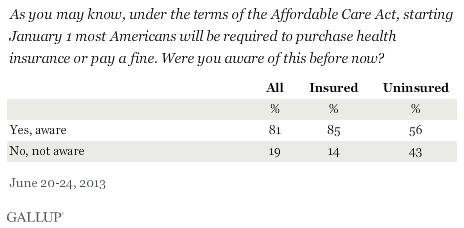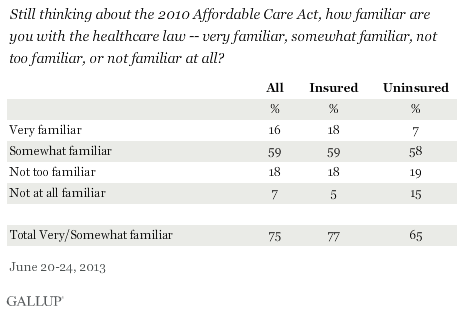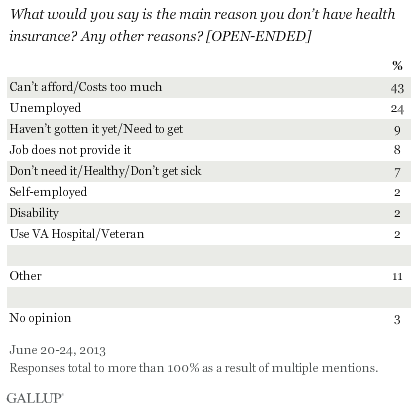PRINCETON, NJ -- The vast majority of Americans, 81%, say they are aware of the 2010 Affordable Care Act's (ACA's) requirement that most Americans must carry health insurance or pay a fine. Americans who are currently uninsured -- those most directly affected by this requirement -- are much less likely to be aware of the provision, with 56% saying they know about it and 43% saying they are unaware.

The results are based on a June 20-24 Gallup poll, which asked a series of questions on the ACA, the comprehensive healthcare reform bill signed into law by President Obama in 2010. Many of the law's key provisions will go into effect January 2014. Gallup previously reported that more Americans thought the law would make the healthcare situation worse than better for themselves and the nation.
The subgroups that are less likely to be aware of the health insurance requirement are also the subgroups that are least likely to be insured, including Hispanics, blacks, young adults, and those in lower-income households.
The federal government is ramping up its efforts to increase awareness among the uninsured to purchase health insurance. Those who lack insurance can find and purchase a plan for 2014 through a government website starting Oct. 1.
Three in Four Americans at Least Somewhat Familiar With the ACA
From a broader perspective, most Americans say they are at least somewhat familiar with the ACA as a whole -- with 16% saying they are very familiar with it and 59% saying they are somewhat familiar with it. Those who currently have insurance are more likely to say they are familiar with the law than those who are uninsured. However, the gap between these two groups on this question -- 12 percentage points -- is much smaller than the 29-point difference in the two groups' awareness of the specific insurance requirement.

Republicans -- who overwhelmingly oppose the ACA -- and Democrats -- who widely support it -- report similar levels of familiarity, 80% and 76%, respectively.
There are significant differences in familiarity by income level, with 89% of upper-income Americans, 76% of middle-income Americans, and 62% of lower-income Americans saying they are very or somewhat familiar with the law.
Cost Is a Major Factor in Being Uninsured
Uninsured Americans are most likely to mention cost and affordability as the reason why they do not have health insurance. Forty-three percent cite this reason, not surprisingly given the dramatic increase in health insurance costs in the last 20 years. One of the major goals of the ACA is to make insurance affordable by offering government subsidies so lower- and middle-income people can purchase it. Thus, the government's ability to make health insurance affordable to those who currently do not have it will be a key factor determining whether the law is successful.
Job considerations are also a major factor for the uninsured, with 24% saying they lack insurance because they are currently unemployed. Also, 8% are working but say their job does not offer health benefits, and another 2% lack health insurance because they are self-employed.

Seven percent say they lack health insurance because they are healthy and don't need it. This is a relatively small percentage of people, but it is important to have people in the insured pool who do not use it that often to keep health insurance costs down.
Nine percent seem likely to purchase insurance soon, saying they need to get it or just have not gotten it yet.
Implications
The ACA was designed to expand health insurance coverage to those who lack it by making it more affordable and requiring those who might not otherwise carry it to do so. Last summer, the U.S. Supreme Court upheld the key provision of the law that requires Americans to carry health insurance or pay a fine, which cleared the way for the more significant parts of the ACA to go into effect as scheduled by Jan. 1, 2014.
With roughly six months to go before Americans are required to carry health insurance, slightly more than half of the uninsured population is aware of that requirement. Making sure the uninsured are aware of the health insurance requirement and getting them onto a health plan by the end of the year is an important goal for the Obama administration and crucial to the ACA's success. One of the hurdles these efforts must overcome will be the perception of the uninsured that they cannot afford health insurance, the main reason they give for not having it.
Survey Methods
Results for this Gallup poll are based on telephone interviews conducted June 20-24, 2013, with a random sample of 2,048 adults, aged 18 and older, living in all 50 U.S. states and the District of Columbia.
For results based on the total sample of national adults, one can say with 95% confidence that the margin of sampling error is ±3 percentage points.
For results based on the total sample of 234 adults without health insurance, one can say with 95% confidence that the margin of sampling error is ±8 percentage points.
Interviews are conducted with respondents on landline telephones and cellular phones, with interviews conducted in Spanish for respondents who are primarily Spanish-speaking. Each sample of national adults includes a minimum quota of 50% cellphone respondents and 50% landline respondents, with additional minimum quotas by region. Landline and cellphone numbers are selected using random-digit-dial methods. Landline respondents are chosen at random within each household on the basis of which member had the most recent birthday.
Samples are weighted to correct for unequal selection probability, nonresponse, and double coverage of landline and cell users in the two sampling frames. They are also weighted to match the national demographics of gender, age, race, Hispanic ethnicity, education, region, population density, and phone status (cellphone only/landline only/both, and cellphone mostly). Demographic weighting targets are based on the March 2012 Current Population Survey figures for the aged 18 and older U.S. population. Phone status targets are based on the July-December 2011 National Health Interview Survey. Population density targets are based on the 2010 census. All reported margins of sampling error include the computed design effects for weighting.
In addition to sampling error, question wording and practical difficulties in conducting surveys can introduce error or bias into the findings of public opinion polls.
View methodology, full question results, and trend data.
For more details on Gallup's polling methodology, visit www.gallup.com.
